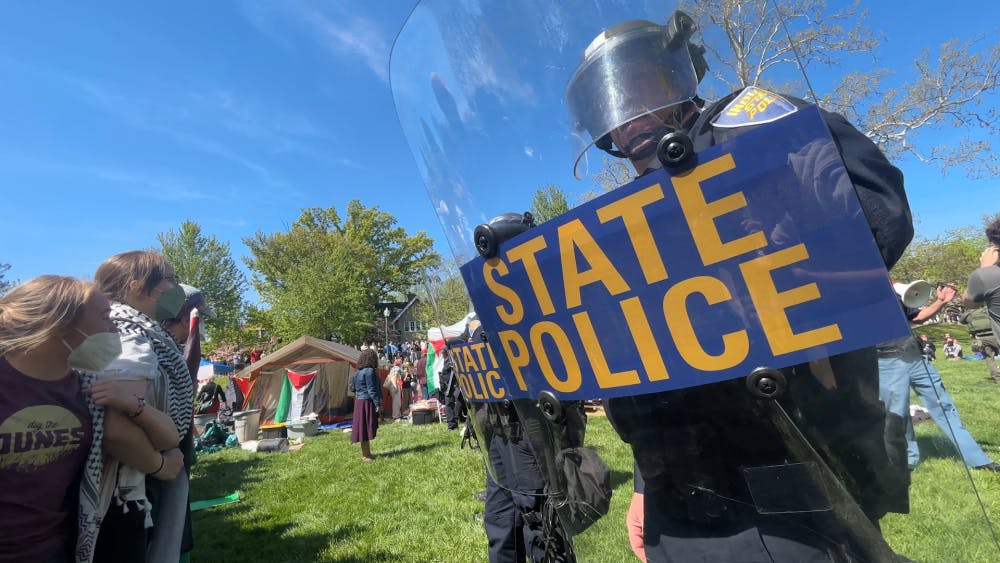BLOOMINGTON, Ind. — The Indiana University Board of Trustees votes Monday on a proposed expressive activity policy that would set new guidelines for when, where and how the IU community can protest on campus.
Some students and faculty expressed their concerns about the policy at a press conference in Dunn Meadow Friday.
"[The policy] goes so far beyond state law and is so restrictive that it essentially is going to freeze all protest on campus," said IU Associate Professor of Fashion Design Heather Akou.
Under the new policy, which was drafted in June, expressive activity would be defined as "assemblies, speech, distribution of written material, carrying of signs, picketing, protests, counter-protests or sit-ins."
If the policy is approved, expressive activity would not be allowed to "unreasonably interfere or substantially disrupt" official activities or the operations of the university.
"This is not going to stop people from speaking out and exercising their First Amendment rights," Akou said.
Additionally, expressive activities would be prohibited in instructional, administrative, or residential purposes or areas not otherwise open to the general public, like classrooms, studios, laboratories, residential spaces and offices.
"There are many demonstrations that students tend to do. They can hold signs, they can put chalk on the sidewalk, they can chant and yell and scream. All of this is protected First Amendment activity," IU Divestment Coalition Spokesman Bryce Greene said." The policy would restrict the boundaries of how those activities can, can occur on university grounds."
Encampments and overnight expressive activity are also prohibited under the proposed policy, which mirrors the policy changed late into the night on April 24, the night before the IU Divestment Coalition began their encampment.
The expressive activity policy sets restrictions on "temporary structures," but does not specifically state what is considered a temporary structure.
However, the policy does mention that signs are not allowed to be posted onto any university-owned property without asking for approval at least 10 days in advance of the protest—a rule Greene and other IU community members say is unconstitutional.
"It causes students who might want to protest to think twice about doing so," Greene said. "It'd have a chilling effect on speech."
On Thursday, IU released the findings from an independent investigation into how the university handled the April protest.
The report concluded that while the decision to change Dunn Meadow policy was permissible, making said change the night before the planned encampment caused “a number of unintended negative consequences.”
“IU leadership’s decision to change the Dunn Meadow policy was permissible under university policies and applicable legal standards, including the First Amendment; however, doing so the night before the planned encampment caused a number of unintended negative consequences,” the law firm wrote in the report.
Among the eight recommendations the report listed for the university, one was to adopt an expressive activity policy.
However, Greene and others worry that the administration would use the results and recommendations from the investigation to argue for the policy approval.
"This policy that they're trying to push was written long before this report was released, long before they had even started writing the rules," Greene said "It's really a misdirection to say that this report would result in the policy being implemented."
The report also concluded that IU has had a decades-long history of “inconsistently” enforcing its policies, which leads to confusion for students, faculty and campus police.
When asked for a comment on concerns expressed over the proposed policy, IU spokesperson Mark Bode said the university refers to a statement issued with the release of the report findings.
“I am grateful for this independent and thorough third-party perspective,” said IU President Pamela Whitten. “We sincerely appreciate the depth and detail of Cooley’s independent review and will leverage their insights to move forward with purpose, guided by our core values and tirelessly pursuing our top priority: a safe campus with freedom of speech for all.”
The IU Board of Trustees meet in a special meeting July 29 to discuss the new policy, which, if adopted, would take effect Aug. 1.
Indiana State Police arrested 55 people on April 25-27, but the Monroe County Prosecutor's Office declined to file any of the charges.










